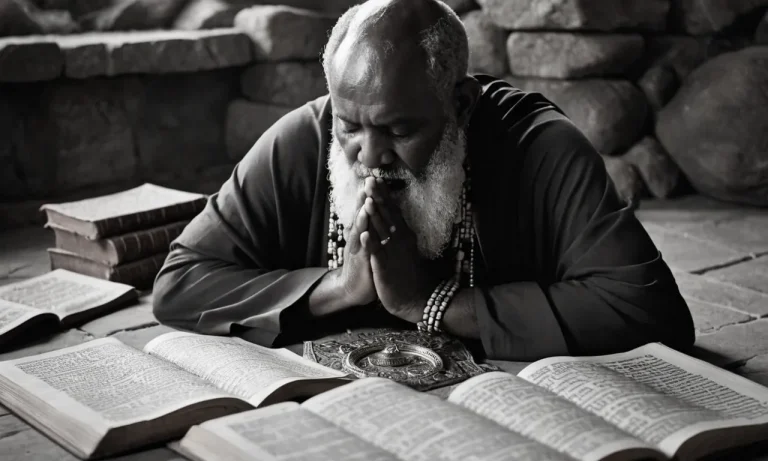What Does The Bible Say About Looking Back?
The act of ‘looking back’ is referenced many times throughout the Bible, typically with an underlying message to keep one’s focus forward on God rather than getting stuck focusing backwards. If you’re short on time, here’s a quick answer: The Bible discourages ‘looking back’ in the sense of longing for the past or dwelling on past mistakes, failures, and sins; instead, it encourages keeping one’s eyes focused ahead on God and pressing on towards the future He has planned.
In this comprehensive article, we will explore numerous biblical passages that reference ‘looking back’ along with their context and meaning. This includes looking back in longing, in judgment or condemnation, in dwelling on past sins, in turning back from following God, and more.
We will also highlight the consistent message across Scripture to keep our eyes focused ahead on God and not get trapped spending too much time looking backwards rather than moving forwards into the hopeful future God intends for His people.
Looking Back in Longing
Looking back can stir up intense emotions. We may long for the past and grieve over lost relationships, missed opportunities, or dreams that never materialized. Though painful, these feelings are normal and even healthy, as long as we don’t get stuck there.
Grieving Over the Past
God tells us there is “a time to weep and a time to laugh, a time to mourn and a time to dance” (Ecclesiastes 3:4). Seasons of sadness and grief are part of life. We see even Jesus, who came to bring hope and healing, weeping at the tomb of his friend Lazarus (John 11:35).
It’s understandable to mourn lost years, failed goals, deceased loved ones, or a more innocent, carefree time of life. God cares about our sorrows: “He heals the brokenhearted and binds up their wounds” (Psalm 147:3). We can pour out our grief to God, knowing He listens with compassion.
Dwelling on the Past
However, we must be careful not to obsess over the past. While grief has its place, dwelling on our losses prevents us from fully embracing the present and future God has for us.
Scripture warns, “Remember Lot’s wife! Whoever tries to keep their life will lose it, and whoever loses their life will preserve it” (Luke 17:32-33). Lot’s wife was turned into a pillar of salt because she looked back with longing to a city God was judging (Genesis 19:26).
Likewise, recalling past sins and failures with excessive regret can be counterproductive. Yes, godly sorrow leads to repentance (2 Corinthians 7:10), but remorse alone changes nothing. Our hope lies in God’s mercy which allows new beginnings.
Moving Forward
Rather than endlessly ruminating, we can channel those feelings in a positive direction. Consider these steps:
- Journal, pray, or talk through your hurt with a trusted friend or counselor.
- Surrender regrets and might-have-beens to God in prayer.
- Forgive yourself and seek forgiveness from others, as needed.
- Determine to press onward rather than return to past pain and failures (Philippians 3:13-14).
- Count present blessings instead of pining for the “good old days.”
- Invest in current relationships and pursue new adventures.
The familiar words assure us, “Weeping may stay for the night, but rejoicing comes in the morning” (Psalm 30:5). With God’s help, we can move into joy again.
Looking Back in Anger or Bitterness
Looking back with resentment, bitterness, or anger at past hurts or mistakes can be spiritually and emotionally harmful. The Bible encourages us to have a forward-looking perspective rather than getting stuck in the past.
The Dangers of Holding Onto Bitterness
Bitterness is like drinking poison and expecting the other person to die. It hurts us more than anyone else. Bitterness can take root deep in our hearts if we continuously dwell on past wrongs or hurts (Hebrews 12:15). It leads to resentment, anger, and an unforgiving attitude.
This prevents us from moving forward and poisons relationships. We miss out on the joy of living fully in the present when focusing too much on the pains of the past. As Ephesians 4:31 says, we must “Get rid of all bitterness, rage and anger, brawling and slander, along with every form of malice. “
Learning from the Past Without Getting Stuck
We should acknowledge the past and learn important lessons from both the good and bad experiences. However, we must be careful not to obsess over analyzing it or wishing things had been different.
As Philippians 3:13-14 reminds us, “But one thing I do: Forgetting what is behind and straining toward what is ahead, I press on toward the goal to win the prize for which God has called me heavenward in Christ Jesus.
“ Keeping our eyes focused ahead on God’s plans and purposes is far more meaningful than remaining angry over unchangeable events.
Cultivating Forgiveness and Gratitude
Instead of lingering bitterness, Scripture encourages us to have forgiving hearts that are filled with gratitude. Forgiving others for past hurts frees us emotionally and spiritually (Matthew 6:14-15). It closes the door on the Enemy who wants to keep our hearts bound by resentment.
1 Thessalonians 5:18 says to, “Give thanks in all circumstances.” Even when we’ve undergone painful experiences, we can find reasons to be grateful if we look hard enough. This keeps our perspective positive rather than negative as we reflect on the past.
Looking Back at Past Sins and Failures
Looking back at our past sins and failures can be a humbling and sobering experience. As Christians, we know that we are all sinners saved by grace (Romans 3:23-24). Yet there are times when we fall short, make poor decisions, and fail to live up to God’s standards.
What should our response be when we reflect on times in our lives when we have missed the mark?
First, we should have an attitude of repentance. True repentance means being sincerely sorry for our sins, asking God for forgiveness, and making a commitment to change (Acts 3:19). Rather than getting stuck in guilt and shame, repentance allows us to experience God’s mercy and move forward.
As 1 John 1:9 reminds us, “If we confess our sins, he is faithful and just and will forgive us our sins and purify us from all unrighteousness.”
Second, we can learn important lessons from past failures. Reflecting on our mistakes allows us to identify patterns of behavior we need to change with God’s help. As Paul wrote, “No discipline seems pleasant at the time, but painful.
Later on, however, it produces a harvest of righteousness and peace for those who have been trained by it” (Hebrews 12:11). While wallowing in regret is unhealthy, prayerful evaluation of our past sins and flaws can lead to growth.
Third, we should be encouraged that God can redeem even our darkest seasons. No failure or sin is beyond God’s ability to bring good from it. The stories of people like David, Jonah, Peter, and Paul remind us that after repentance, God restored these flawed leaders to do great things for His kingdom.
As Romans 8:28 promises, “In all things God works for the good of those who love him.”
Finally, reflecting on past sins keeps us humble and helps us extend grace to others. Remembering how much God has forgiven us motivates us to show patience and compassion to those who struggle and stumble on their spiritual journey.
The repentant tax collector in Luke 18:13 cried out, “God, have mercy on me, a sinner.” This humble honesty led Jesus to declare he went home justified before God (Luke 18:14).
The healthiest approach is to look back in order to look forward. We examine our past failures through the lens of God’s love and mercy, learn whatever lessons we can, receive His forgiveness, and press on toward maturity in Christ.
As Paul declared after reflecting on his life, “Forgetting what is behind and straining toward what is ahead, I press on toward the goal to win the prize for which God has called me heavenward in Christ Jesus” (Philippians 3:13-14).
Turning Back from Following God
Turning back from following God after initially committing to Him is a grievous sin according to Scripture. King Saul’s life provides a sobering example of what can happen when we harden our hearts and turn away from the Lord.
Though Saul started well, he later rejected God’s instructions and sought guidance from a medium (1 Samuel 15:10-11). As a result, the Spirit of the Lord departed from Saul and he lost his kingship (1 Samuel 15:23; 16:14).
Why do some believers turn away from following Christ? Here are some potential reasons:
- They lose their initial zeal and love for God (Revelation 2:4).
- Persecution or trials make them stumble (Mark 4:17).
- They become enamored with the world (2 Timothy 4:10).
- False teaching deceives them (Galatians 3:1).
- Sin and unrepentant hearts harden them (Hebrews 3:13).
Turning back after claiming to follow Jesus has dire consequences. Peter reminds us that it would be better not to have known Christ than to later reject him (2 Peter 2:20-21). The book of Hebrews solemnly warns that those who fell away cannot be renewed again to repentance because they recrucify Jesus (Hebrews 6:4-6).
However, as long as we draw breath, it is not too late to repent and return to God. He promises that if we confess our sins, He is faithful to forgive us and cleanse us (1 John 1:9). The parable of the prodigal son shows God’s abundant mercy toward those who come back to Him (Luke 15:11-32).
Even if our faith has grown cold, Jesus stands at the door and knocks, inviting us to recommit and restore our relationship with Him (Revelation 3:20).
Here are some practical steps to take if you have turned away from following God:
- Humble yourself and admit your sinful choice (1 John 1:9).
- Draw near to God again (James 4:8).
- Immerse yourself in Scripture to renew your mind (Psalms 119:9).
- Pray for God to rekindle your spiritual passion (Psalm 80:18).
- Find accountability through Christian community (Hebrews 10:24-25).
- Remove any idols that have drawn you away from Christ (1 John 5:21).
While Scripture warns strongly against turning back, God’s arms are wide open to welcome home His repentant children. We can find restoration by responding to His gracious invitation today.
Keeping Our Eyes Focused Ahead
As Christians, we know that God calls us to keep our eyes focused on Him and the hope of eternity rather than dwelling on past mistakes and failures. But that can be easier said than done. When regret, shame, or disappointment over the past tries to drag us backward, how do we press onward?
Learn from the Past Without Lingering There
We can glean wisdom from the past without remaining stuck there. As the old adage goes, “Those who cannot remember the past are condemned to repeat it.” We can reflect on former times, assess what went right and what went wrong, acknowledge where we missed God’s guidance, and determine to walk more closely with Him going forward.
The apostle Paul put it this way: “Not that I have already obtained this or am already perfect, but I press on to make it my own, because Christ Jesus has made me his own” (Philippians 3:12). Our imperfection is no excuse for paralysis. We simply press on, keeping our eyes fixed on Jesus.
Trust in God’s Forgiveness and Grace
Dwelling on the past can often lead to guilt, regret, and condemnation – feelings that will spiritually paralyze us if left unchecked. But Scripture reminds us that condemnation has no place in Christ. “There is therefore now no condemnation for those who are in Christ Jesus” (Romans 8:1).
Once we have confessed our sins before God, He casts them out of His presence (Psalm 103:12). He separates our transgressions from us as far as the east is from the west (Psalm 103:12). We can hold fast to His promise that His mercies are new every morning (Lamentations 3:22-23).
No matter what we’ve done, His grace and forgiveness are sufficient to redeem us and propel us forward.
Set Your Mind on Things Above
Rather than remaining focused on the past, God calls us to set our minds on things above – the eternal reality that supersedes our current circumstances (Colossians 3:2). He understands that we are prone to human weakness, fear, and regret.
But He gently and repeatedly redirects our gaze to the hope that lies before us.
The book of Hebrews calls this “fixing our eyes on Jesus, the pioneer and perfecter of faith” (Hebrews 12:2). As we fix our eyes on Him – His sinless example, His atoning sacrifice for our sins, His current ministry and soon return – it orients our perspective toward the eternal.
The cares of this world and the burdens of the past grow strangely dim in the light of His glory and grace.
Conclusion
In conclusion, while there are certainly understandable human tendencies to look backwards at the past, the consistent message across Scripture urges us to keep our eyes focused ahead. Rather than longing for the past, dwelling on sins and failures, or turning back from following God, we are called to continually press on towards the future God has prepared for us, trusting in His faithful promises.
Keep this biblical perspective in mind whenever you find yourself spending too much time looking back. Turn your eyes ahead to what God has in store – that is where hope and purpose are found.








